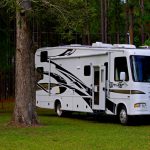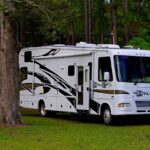Thinking about buying an RV but stuck between the dealership lot and a private seller’s listing? You’re not alone! Every year, thousands of adventure seekers face the same dilemma: Should I buy from a trusted dealership with warranties and financing, or chase a bargain in the private market? Spoiler alert—there’s no one-size-fits-all answer, but knowing the pros, cons, and hidden costs can save you thousands and a ton of headaches.
Did you know that towable RV sales like travel trailers are up over 17% this year, while motorhome sales have dipped sharply? Or that trading in your old RV at a dealership can actually save you money on sales tax? Later, we’ll break down these surprising facts and reveal insider tips on inspections, financing, and tax tricks that dealers don’t want you to miss. Whether you’re eyeing a sleek Keystone fifth wheel or a vintage Airstream, this guide will help you navigate the maze with confidence and flair.
Key Takeaways
- Dealerships offer convenience, financing, and warranties but usually at a higher price. They handle paperwork, provide trade-in tax credits, and offer peace of mind.
- Private sales can save you money upfront but come with more risk and require thorough inspections and paperwork management.
- New RVs come with the latest features and warranties but depreciate quickly; used RVs offer better value if carefully vetted.
- Professional RV inspections are non-negotiable, especially for private sales, to avoid costly surprises.
- Understanding state-specific sales tax rules and trade-in credits can save you thousands.
- Renting is a great way to test RV life before committing to a purchase.
👉 Shop Popular RV Brands:
- Keystone RVs: RVShare | Camping World | Keystone RV Official Website
- Jayco: RVShare | Camping World | Jayco Official Website
- Forest River: RVShare | Camping World | Forest River Official Website
Table of Contents
- ⚡️ Quick Tips and Facts for Savvy RV Shoppers
- 🗺️ The Great RV Debate: Dealership vs. Private Sale Showdown!
- 🤔 New vs. Used RVs: Which Path to Adventure?
- 💰 Understanding RV Valuation: What’s Your Rig Really Worth?
- 💸 Sweetening the Deal: Unpacking RV Rebates & Incentives
- 🔄 The Trade-In Tango: Maximizing Your RV’s Value
- 🏦 Financing Your RV Dream: Loans, Rates, and Options
- 🔍 The All-Important RV Inspection: Don’t Skip This Step!
- 🛡️ RV Warranties and Service Contracts: Peace of Mind or Pitfall?
- ⚖️ Navigating the Legal Landscape: RV Sales & Use Tax Essentials
- ✅ Unlocking Potential Savings: RV Sales Tax Exemptions & Credits
- 🌎 Out-of-State RV Purchases: What Non-Residents Need to Know
- 🛡️ Oops! Correcting RV Sales Tax Errors: Abatements & Refunds
- 🛣️ Beyond Sales Tax: Understanding Annual RV Excise & Registration Fees
- 🛣️ The Freedom of Ownership: Buying an RV
- 🏕️ The Flexibility of Exploration: Renting an RV
- 📊 Crunching the Numbers: Buy vs. Rent Financial Considerations
- Conclusion: Your RV Adventure Awaits!
- Recommended Links
- FAQ
- Reference Links
Here at RV Brands™, we’ve seen it all. From shiny new motorhomes rolling off the lot to dusty diamonds-in-the-rough parked in a stranger’s driveway. The journey to RV ownership is a thrilling one, but the first major fork in the road is often the biggest: Dealership vs. Private Sale. It’s the ultimate showdown, a clash of titans that can define your entire RVing experience.
We’re here to be your cornermen, your pit crew, and your trusted guides. We’ll break down every angle of the RV sales world, from the handshake on the lot to the fine print on the tax forms. So grab a camp chair, and let’s dive in.
⚡️ Quick Tips and Facts for Savvy RV Shoppers
In a hurry to hit the road? Here’s the lowdown on the RV sales landscape.
- Dealership vs. Private Sale: Dealerships offer convenience, financing, and warranties, but often at a higher price. Private sales can offer better deals but come with more risk and legwork.
- Market Trends: The latest RV industry outlook shows a complex picture. According to a 2024 report from Bish’s RV, “While manufacturers are shipping more units compared to last year, actual sales are trending down.” This means it’s a buyer’s market, especially for certain types of RVs!
- Towables are Hot: Lightweight travel trailers and affordable Fifth Wheel RVs are in high demand, while sales for larger, more expensive motorhomes have slowed.
- Tax Matters: Most states charge a sales tax (e.g., 6.25% in Massachusetts) on RV purchases. When buying from a dealer, your trade-in value usually reduces your taxable amount. This is not the case in most private sales!
- Inspection is King: Never, ever buy an RV without a thorough inspection. For private sales, hiring a certified NRVIA inspector is the best money you’ll ever spend.
- Book Value Isn’t Everything: For trailers, the tax is based on the actual sales price, not a “book value.” As the Massachusetts tax guide states, “For trailers, you are taxed on the actual sales price. Book value rules do not apply.”
- Financing: Getting pre-approved for a loan from your bank or credit union before you shop gives you massive negotiating power at a dealership.
🗺️ The Great RV Debate: Dealership vs. Private Sale Showdown!
Alright, let’s get into the main event. Choosing where to buy your RV is as important as choosing which RV to buy. Both paths can lead to happiness, but they are very different journeys.
The Dealership Experience: Convenience, Confidence, and Caveats
Walking onto a dealership lot like Porter’s RVs or a massive Camping World is like being a kid in a candy store. The selection is vast, the units are clean, and there’s a whole team of people ready to help you. It’s a streamlined, one-stop-shop experience designed for convenience.
One of our team members, Dave, bought his first Keystone Cougar from a dealer. “I was a total newbie,” he says. “I didn’t know a black tank from a propane tank. The dealer walked me through everything, handled all the DMV paperwork, got me financed, and even threw in a starter kit. For me, that peace of mind was worth the premium.”
✅ Pros of Buying from an RV Dealership
- One-Stop Shopping: You can browse dozens of models, get financing, handle trade-ins, and complete all the titling and tax paperwork in one place.
- Financing Options: Dealers have established relationships with multiple lenders, making it easy to secure an RV loan, even for those with less-than-perfect credit.
- Trade-Ins Welcome: Have an old RV? A dealership makes trading it in simple. Plus, the value of your trade-in typically reduces the taxable sales price of your new RV—a huge financial benefit.
- Warranties & Service: New RVs come with manufacturer warranties, and dealers often offer extended service contracts on used units. Plus, you have a dedicated service center for future repairs.
- Reputation and Recourse: A reputable dealer has a business to protect. If a major issue arises right after the sale, you have a clear place to go for help.
❌ Cons of Buying from an RV Dealership
- Higher Prices: Dealerships have overhead—a big lot, a sales team, a service department—and that cost is baked into the price of their RVs.
- Sales Pressure: While not all salespeople are pushy, their job is to sell. You may feel pressured to make a quick decision or add on extras you don’t need.
- Depreciation: A brand-new RV loses a significant chunk of its value the second you drive it off the lot, much like a new car.
- Hidden Fees: Always read the fine print! Look out for doc fees, prep fees, and other administrative charges that can inflate the final price.
The Private Party Pursuit: Bargains, Risks, and Rewards
Buying from a private seller is the wild west of the RV world. It’s where you’ll find the best bargains and the most unique rigs, but it’s also where you’re most exposed to risk. This path requires more work, more due diligence, and a healthy dose of skepticism.
Our colleague Sarah is a seasoned pro at this. She found her beloved vintage Airstream on RV Trader, listed by a retired couple. “I saved a fortune,” she recalls, “but I did my homework. I spent hours talking to the owners, got a detailed history, and hired a certified inspector to go over it with a fine-tooth comb. It was a process, but I got a classic rig for a fraction of what a dealer would ask.”
✅ Pros of Buying an RV from a Private Seller
- Lower Prices: This is the #1 reason to buy private. With no overhead, private sellers can offer their RVs for significantly less than a dealer.
- No Sales Pressure: You’re dealing with an individual, not a commissioned salesperson. The pace is usually more relaxed.
- Negotiation Potential: Private sellers are often more flexible on price, especially if they’re motivated to sell.
- Owner Insights: You can get the real, unvarnished history of the RV directly from the person who used it. They can tell you about its quirks, upgrades, and favorite destinations.
❌ Cons of Buying an RV from a Private Seller
- “As-Is” Sales: There is no warranty. Once you hand over the cash and the title is signed, that RV and all its potential problems are yours.
- More Legwork: You are responsible for everything: finding a loan, verifying the title is clean, handling the transfer at the DMV, and calculating and paying sales tax.
- No Trade-In Tax Benefit: As the Massachusetts guide points out, in casual sales, “No reduction in taxable sales price is allowed as a result of a trade-in.” This can be a major hidden cost.
- Risk of Scams or Hidden Damage: You have to be vigilant about title washing, undisclosed water damage, or mechanical issues the seller “forgot” to mention.
Side-by-Side Showdown: Dealership vs. Private Sale Comparison Table
| Feature | 🏢 RV Dealership | 🙋♂️ Private Seller |
|---|---|---|
| Price | Higher | Lower |
| Selection | Large, concentrated | Scattered, requires searching |
| Financing | ✅ Easy, in-house options | ❌ You must secure your own loan |
| Trade-Ins | ✅ Simple process | ❌ Difficult, no tax benefit |
| Warranty | ✅ Yes (new) or optional (used) | ❌ No, sold “as-is” |
| Paperwork | ✅ Handled for you | ❌ Your responsibility |
| Inspection | Dealer PDI (Pre-Delivery Inspection) | Crucial to hire your own inspector |
| Recourse | ✅ Yes, you can go back to the dealer | ❌ Very limited to none |
| Convenience | High | Low |
| Negotiability | Moderate | High |
🤔 New vs. Used RVs: Which Path to Adventure?
This decision often goes hand-in-hand with where you buy. While dealers sell both, the biggest draw of the private market is the huge selection of used RVs.
The Allure of a Brand-New RV
There’s nothing like that “new RV smell.” You get the latest technology, modern designs, a full manufacturer’s warranty, and the knowledge that you’re the very first person to sleep in that bed. You can choose your exact floorplan and options, creating your perfect home-on-wheels from scratch. Many new RVs, especially high-end models, fall into the Luxury RVs category, offering unparalleled comfort.
However, be prepared for the “shakedown” period. It’s an unfortunate reality that almost every new RV, from a basic Forest River R-Pod to a top-of-the-line Newmar, will have a list of small issues that need to be fixed under warranty in the first few months.
The Value Proposition of a Pre-Owned RV
The biggest advantage of buying used is avoiding the initial, steep depreciation. The first owner took that financial hit for you! A well-maintained, 2-3 year old RV can offer incredible value. Often, the previous owner has already worked out all the new-RV kinks and may have even added valuable upgrades like solar panels, better batteries, or improved suspension.
The key is due diligence. A used RV’s condition is entirely dependent on how it was cared for. This is where a professional inspection becomes your most powerful tool.
💰 Understanding RV Valuation: What’s Your Rig Really Worth?
Whether you’re buying, selling, or trading, you need to know the fair market value of the RV. Don’t just trust the seller’s asking price or the dealer’s initial offer.
Key Factors Influencing RV Value
- Age and Condition: The most obvious factors.
- Brand and Model: Well-known Fifth Wheel RV Manufacturers like Grand Design or Alliance tend to hold their value better.
- Mileage (for Motorhomes): Lower is generally better, but regular use is healthier than sitting for years.
- Maintenance Records: A thick folder of service receipts is like gold. It proves the RV was cared for.
- Upgrades: Solar, lithium batteries, and suspension upgrades can add value.
- Water Damage: Any sign of past or present leaks is a massive red flag and a value-killer.
Tools for Accurate RV Appraisal
The industry standard for RV values is the NADAguides from J.D. Power. This is what banks, insurance companies, and dealers use to determine wholesale (trade-in) and retail values. You can look up values online for a fee. It’s a small investment that can save you thousands. Also, browse listings for comparable models on sites like RV Trader and Facebook Marketplace to get a real-world sense of asking prices.
💸 Sweetening the Deal: Unpacking RV Rebates & Incentives
Who doesn’t love a good deal? In the RV world, “discounts” come in a few different flavors, and it’s important to know the difference.
Manufacturer Rebates and Promotions
These come directly from the manufacturer (e.g., Thor, Winnebago) to encourage sales of specific models, often at the end of a model year. The great thing about a manufacturer rebate applied at the time of sale is that it reduces the taxable amount of your purchase. A post-sale rebate (one you mail in for) does not.
Dealership-Specific Discounts
This is the “wiggle room” in the dealer’s pricing. It might be a “show special,” an “end-of-month” deal, or just good old-fashioned negotiation. These discounts also lower your final price, but they are entirely at the dealer’s discretion.
Pro Tip: The best time to buy is often in the fall and winter. Dealers are trying to clear out last year’s models to make room for the new inventory, and foot traffic is slower. As the Bish’s RV report notes, “The end of the year is when most dealers offer great deals.”
🔄 The Trade-In Tango: Maximizing Your RV’s Value
Trading in your old RV at a dealership is undeniably convenient. But is it the most financially savvy move? That depends.
When to Trade In vs. Sell Outright
You will almost always get more money by selling your RV privately than by trading it in. A dealer has to recondition and resell your trade-in for a profit, so they’ll offer you a “wholesale” or “actual cash value” (ACV), which is lower than its retail value.
However, don’t forget the tax advantage. In most states, the value of your trade-in is deducted from the sales price of the new RV before sales tax is calculated.
Example:
- New RV Price: $80,000
- Trade-in Value: $30,000
- Taxable Amount: $50,000
- Sales Tax (at 7%): $3,500
If you sold your RV privately for $35,000 and then bought the new RV, you’d pay tax on the full $80,000.
- Sales Tax (at 7%): $5,600
In this case, the $2,100 tax savings makes the $5,000 difference between the private sale price and the trade-in value much smaller. You have to weigh the convenience and tax savings against the potentially higher private sale price.
Preparing Your RV for Trade-In
To get the best possible offer, treat your trade-in like you’re selling it privately.
- Clean it meticulously, inside and out.
- Fix any small, obvious issues.
- Gather all your maintenance records.
- Ensure all systems are in working order.
A clean, well-documented RV signals to the dealer that it was well-cared for, making them more confident in offering a higher value.
🏦 Financing Your RV Dream: Loans, Rates, and Options
For most people, buying an RV involves a loan. RV loans are a bit different from car loans; they often have longer terms (10, 15, or even 20 years), which can make the monthly payments more manageable.
Dealership Financing vs. External Lenders
Dealerships have a Finance & Insurance (F&I) office that acts as a broker, sending your application to a network of lenders. This is convenient, but it may not get you the absolute best rate.
We strongly recommend getting pre-approved for a loan from your own bank or a credit union before you start shopping. This gives you a benchmark rate to compare against the dealer’s offer. It also turns you into a “cash buyer” in the dealer’s eyes, which gives you more power to negotiate the price of the RV itself, separate from the financing.
Understanding RV Loan Terms and Conditions
- Interest Rate: The cost of borrowing money. Your credit score is the biggest factor here.
- Loan Term: The length of the loan. A longer term means lower monthly payments but more total interest paid over the life of the loan.
- Down Payment: Most lenders require 10-20% down. A larger down payment can help you secure a better interest rate.
🔍 The All-Important RV Inspection: Don’t Skip This Step!
If you only take one piece of advice from this article, let it be this: GET A PROFESSIONAL RV INSPECTION.
We cannot stress this enough. An RV is a house on wheels, with multiple complex systems: plumbing, electrical (both 12V and 120V), propane, and structural components. Water damage, the silent killer of RVs, can be incredibly difficult to spot for an untrained eye.
Why a Professional RV Inspection is Non-Negotiable
This is especially true for private sales, but it’s also a smart move for used units on a dealer’s lot. A dealer’s “PDI” (Pre-Delivery Inspection) is not the same as an independent, third-party inspection. The inspector works for you.
A comprehensive inspection report can be your greatest negotiation tool. If it uncovers issues, you can ask the seller to fix them or lower the price accordingly. If it uncovers major problems like a rotten floor or a bent frame, it gives you the confidence to walk away and dodge a massive bullet.
What an RV Inspector Looks For
A certified inspector from an organization like the National RV Inspectors Association (NRVIA) will spend hours examining every aspect of the rig:
- Roof and Sealants: Checking for cracks and potential leak points.
- Life Safety Systems: Testing smoke/CO detectors, propane leak detectors, and fire extinguishers.
- All Appliances: Running the fridge, A/C, furnace, water heater, etc., on all available power sources.
- Plumbing System: Checking for leaks and proper function of tanks and pumps.
- Electrical Systems: Testing outlets, converters, inverters, and batteries.
- Tires and Frame: Checking tire date codes, suspension, and looking for frame damage.
🛡️ RV Warranties and Service Contracts: Peace of Mind or Pitfall?
Warranties provide a safety net, but it’s crucial to understand what they do—and don’t—cover.
Manufacturer Warranties on New RVs
New RVs typically come with a 1-3 year limited “bumper-to-bumper” warranty from the manufacturer and individual warranties on components like the refrigerator or air conditioner. Read the terms carefully. They cover defects in materials and workmanship, not issues from normal wear and tear or lack of maintenance (like failing to maintain roof seals).
Extended Service Plans for Used RVs
Often called “extended warranties,” these are actually service contracts—an insurance policy against future mechanical breakdowns. They are heavily pushed by dealership F&I departments. Can they be valuable? Yes, especially on a complex motorhome. But they can also be expensive and have many exclusions. Read the contract with a magnifying glass before you sign. Understand the deductible, what’s covered, and the process for getting repairs approved.
⚖️ Navigating the Legal Landscape: RV Sales & Use Tax Essentials
Ah, taxes. The least fun part of any major purchase. When you buy an RV, you’ll almost certainly have to pay sales or use tax. The rules can be confusing and vary significantly by state.
Understanding State-Specific RV Sales Tax Rules
The tax is generally based on the state where you will register the RV, not necessarily where you buy it. Some states have no sales tax (like Montana or Oregon), which leads some people to explore setting up an LLC to register their RV there. This is a complex legal area, and we recommend consulting with a specialized attorney before going down that road. For most people, you’ll pay tax in your home state. For example, the Massachusetts Department of Revenue clearly outlines its 6.25% sales and use tax on vehicles.
The Role of Dealerships in Tax Collection
When you buy from a dealer, they handle this for you. They will collect the appropriate sales tax based on your state of residence and remit it to the government along with your title and registration paperwork. It’s part of the convenience factor. If you buy from a private seller, you are responsible for calculating and paying the use tax directly to your state’s DMV or Department of Revenue when you go to register the RV.
✅ Unlocking Potential Savings: RV Sales Tax Exemptions & Credits
In certain situations, you might be able to reduce your tax burden or avoid it altogether.
Common RV Sales Tax Exemptions
These are highly state-specific, but common exemptions can include:
- Family Transfers: Gifting an RV to a direct family member.
- Inheritance: Transferring a title as part of an estate.
- Sales to Exempt Organizations: Selling to a registered 501(c)(3) charity.
- Full-Time RVing Domicile: Some states, like South Dakota and Texas, are popular domiciles for Full-Time RVing and have favorable tax structures.
Credits for Trade-Ins and Out-of-State Purchases
As we’ve covered, the trade-in credit at a dealership is a major tax-saver. Additionally, if you buy an RV in one state and pay sales tax there, but then register it in your home state within a certain timeframe, your home state will usually give you a credit for the tax you already paid. If the tax in the purchase state was lower, you’ll just pay the difference.
🌎 Out-of-State RV Purchases: What Non-Residents Need to Know
It’s common to travel to another state to get the perfect RV or a better price. This adds a layer of logistical and legal complexity.
Navigating Multi-State Sales Tax and Registration
The key is reciprocity. Most states have agreements to honor sales tax paid in other states. The dealer in the purchase state will often have the forms to help you pay the tax for your home state, or they may let you leave without paying tax if you sign an affidavit promising to pay it when you register back home.
Temporary Tags and Transport Considerations
The selling dealer will issue you a temporary tag (or “trip permit”) that allows you to legally drive the RV back to your home state. Make sure you have insurance coverage in place before you leave the lot!
🛡️ Oops! Correcting RV Sales Tax Errors: Abatements & Refunds
Mistakes happen. Maybe the sales price was recorded incorrectly, or a trade-in credit wasn’t applied. What can you do?
When and How to Request a Sales Tax Abatement
If you believe you’ve overpaid sales or use tax, you can file for an abatement or refund with your state’s tax authority. For example, Massachusetts provides Form ABT, Application for Abatement, for this purpose. There are strict deadlines, so act quickly if you spot an error.
Documentation Needed for a Successful Claim
You’ll need to provide clear proof of the error. This includes:
- The Bill of Sale
- The title application
- Proof of payment
- Any documentation supporting your claim (e.g., a corrected purchase agreement, proof of a trade-in).
🛣️ Beyond Sales Tax: Understanding Annual RV Excise & Registration Fees
The purchase price is just the beginning! Every year, you’ll have to pay to keep your RV legal on the road.
Annual Registration Requirements by State
Just like your car, your RV needs to be registered, and the plates need to be renewed annually or biennially. The fees can vary wildly based on the RV’s weight, value, or type. Motorhomes often have higher registration fees than travel trailers.
Calculating Your RV’s Excise Tax
Many states, like Massachusetts, also charge an annual excise tax in addition to registration fees. This is a property tax based on the value of the vehicle. The value decreases each year as the RV depreciates, so your excise tax bill should get a little smaller over time. This is an important, often overlooked, part of the total cost of RV ownership.
🛣️ The Freedom of Ownership: Buying an RV
So, with all these considerations, why buy? Because there is nothing like the freedom of having your own adventure-mobile, ready to go whenever you are.
Long-Term Cost-Effectiveness
If you plan to travel frequently, buying an RV can be more cost-effective than repeatedly renting or paying for hotels and flights. You’re building equity in an asset (albeit a depreciating one), and your “hotel room” is always ready and packed with your own stuff.
Customization and Personalization
This is your space! You can renovate, redecorate, and upgrade to your heart’s content. Want to install a massive solar array for off-grid living? Go for it. Want to paint the cabinets and replace the furniture? It’s all yours. This level of personalization is impossible with a rental.
👉 Shop Popular RV Brands:
- Keystone RV: RVShare | Camping World | Keystone RV Official Website
- Jayco: RVShare | Camping World | Jayco Official Website
- Forest River: RVShare | Camping World | Forest River Official Website
- Grand Design: RVShare | Camping World | Grand Design Official Website
🏕️ The Flexibility of Exploration: Renting an RV
But what if you’re not ready for that level of commitment? What if you’re just RV-curious? That’s where renting shines.
Ideal for Short-Term Adventures
If you only plan to take one or two RV trips a year, renting is almost certainly the cheaper and easier option. You don’t have to worry about storage, insurance, maintenance, or depreciation. You just book, pick it up, have an amazing trip, and drop it off.
Trying Before You Buy
Renting is the ultimate test drive. Thinking about a Class C motorhome but wondering if you’d prefer a travel trailer? Rent both! Platforms like RVShare and Outdoorsy let you rent directly from owners, so you can try out specific models and floorplans to see what truly fits your travel style before making a massive purchase.
📊 Crunching the Numbers: Buy vs. Rent Financial Considerations
Let’s put some structure around this. The decision to buy or rent often comes down to how often you’ll use the RV.
Comparing Upfront Costs and Ongoing Expenses
| Cost Category | 💰 Buying an RV | 🗓️ Renting an RV |
|---|---|---|
| Upfront Cost | Large (Down payment, sales tax) | Small (Security deposit, rental fee) |
| Monthly Cost | Loan payment, insurance, storage | Zero (when not in use) |
| Maintenance | Your responsibility (can be costly) | Included / Owner’s responsibility |
| Depreciation | You absorb the loss in value | Not your problem! |
| Flexibility | Limited to one RV | Can try different types/sizes |
| Availability | Always ready to go | Must book in advance |
The Break-Even Point: When Does Buying Make Sense?
There’s no magic number, but a common rule of thumb is that if you plan to use an RV for more than 4-6 weeks per year, buying starts to become more financially viable than renting. You need to do your own math based on the cost of the RV you want vs. the rental rates in your area. But once you cross that threshold, the costs of renting start to add up, and the investment in ownership begins to pay for itself, both in dollars and in priceless freedom.
Conclusion: Your RV Adventure Awaits!

So, what’s the final word on the great RV sales vs. private sale debate? After unpacking every angle—from market trends and financing to inspections and tax nuances—here’s what we at RV Brands™ confidently recommend:
-
Dealerships are your best bet if you crave convenience, warranties, and financing options. They handle the paperwork, offer trade-in credits that save you money on taxes, and provide peace of mind with professional inspections and service centers. You’ll pay a premium for this, but for many, it’s worth every penny.
-
Private sales can deliver significant savings and unique finds, especially if you’re willing to roll up your sleeves and do your homework. The risk is higher, but with a thorough inspection and careful vetting, you can snag a fantastic deal.
-
When it comes to new vs. used, new RVs offer the latest tech and full warranties but depreciate quickly. Used RVs, especially well-maintained ones, can be a steal if you’re diligent about inspections and history.
-
Don’t underestimate the importance of professional inspections—they are your best defense against costly surprises.
-
Tax considerations can make or break a deal, especially with trade-ins and out-of-state purchases. Always research your state’s rules or consult a tax professional.
-
Finally, if you’re not ready to commit, renting is a fantastic way to explore RV life without the upfront costs or long-term obligations.
Remember Dave’s story? His dealer-bought Keystone Cougar came with peace of mind and a smooth buying experience. And Sarah? Her private-sale vintage Airstream was a labor of love that paid off big time. Your adventure will be unique, but armed with this knowledge, you’re ready to make the best choice for your lifestyle and budget.
So, what’s your next move? Will you stroll the dealership lot, or scour the classifieds? Either way, your RV adventure awaits—happy trails! 🚐✨
Recommended Links
👉 CHECK PRICE on:
- Keystone RVs: RVShare | Camping World | Keystone RV Official Website
- Jayco RVs: RVShare | Camping World | Jayco Official Website
- Forest River RVs: RVShare | Camping World | Forest River Official Website
- Grand Design RVs: RVShare | Camping World | Grand Design Official Website
- Airstream Trailers: RVShare | Camping World | Airstream Official Website
Books for RV Enthusiasts:
- The RV Handbook: Essential How-To Guide for the RV Owner by Dave Solberg — Amazon Link
- RV Repair and Maintenance Manual by Bill Moeller — Amazon Link
- The Complete Guide to Buying and Selling an RV by Mark J. Polk — Amazon Link
FAQ

What are the pros and cons of buying a new RV versus a used one?
Pros of New RVs:
- Latest technology and features
- Full manufacturer warranty
- Customizable options and floorplans
- Less chance of hidden damage or wear
Cons of New RVs:
- Higher purchase price
- Rapid depreciation (up to 20-30% in the first year)
- Potential “shakedown” issues requiring warranty repairs
Pros of Used RVs:
- Lower purchase price with less depreciation
- Potential upgrades and improvements already installed
- Opportunity to buy discontinued or rare models
Cons of Used RVs:
- Possible hidden damage or deferred maintenance
- Limited or no warranty coverage
- Requires thorough inspection and vetting
Our advice: If you want peace of mind and the latest features, go new. If you want value and don’t mind doing homework, used is a great choice.
Read more about “What Are the RV Statistics? 75 Essential Insights for 2025 🚐”
How do RV sales compare to trailer sales in terms of market trends?
According to the latest Bish’s RV 2024 report, towable RVs like travel trailers and fifth wheels are experiencing growth, with travel trailers up 17.4% in shipments year-over-year. In contrast, motorized RV sales (Class A, B, and C motorhomes) are down significantly, with Class A and B motorhomes each down 32%.
This reflects shifting consumer preferences toward more affordable, lightweight, and towable options. Trailers offer flexibility, easier maintenance, and lower operating costs, making them attractive in a market sensitive to rising interest rates and fuel costs.
Read more about “🚐 RV Price Trends (2025): 12 Insider Insights You Can’t Miss”
What are the differences between Class A, B, and C RV sales versus travel trailer sales?
- Class A Motorhomes: Large, bus-like vehicles with high price points and luxury features. Sales have declined due to cost and regulatory concerns.
- Class B Motorhomes (Camper Vans): Compact and versatile but also expensive. Sales are down as well.
- Class C Motorhomes: Mid-sized, recognizable by the cab-over design. Sales are down but remain popular for families.
- Travel Trailers: Towable units hitched to a vehicle. They are generally more affordable and easier to maintain. Sales are rising, reflecting consumer demand for budget-friendly options.
The market is favoring towables over motorized units due to cost, fuel efficiency, and regulatory uncertainty around diesel engines.
How do gas-powered RV sales compare to diesel-powered RV sales in terms of cost and performance?
- Gas-Powered RVs: Generally less expensive upfront and cheaper to maintain. They offer adequate power for most users and are widely available. However, they have lower fuel efficiency and less torque compared to diesel engines.
- Diesel-Powered RVs: Higher initial cost and maintenance expenses but superior fuel efficiency, torque, and longevity. Diesel pushers (Class A) are prized for long-distance travel and heavy towing but face potential future regulatory challenges (e.g., diesel bans in some states).
Sales data shows diesel motorhomes are declining faster than gas-powered ones, partly due to cost and anticipated regulations. Buyers should weigh performance benefits against price and potential resale challenges.
How does trading in an RV affect sales tax compared to selling privately?
When you trade in your RV at a dealership, the trade-in value typically reduces the taxable amount of your new purchase, saving you money on sales tax. In private sales, you pay sales or use tax on the full purchase price without any trade-in credit, which can increase your tax burden significantly.
What should I look for in a professional RV inspection?
A professional RV inspection covers structural integrity, roof condition, plumbing, electrical systems, appliances, tires, and safety equipment. Inspectors look for water damage, leaks, frame issues, and operational problems. This inspection is crucial, especially for private sales, to avoid costly surprises.
Read more about “Discover 12 Incredible Used RVs for Sale Under $5,000 … 🚐✨”
Reference Links
- Massachusetts Motor Vehicle and Trailer Sales and Use Tax Guide
- Bish’s RV 2024 Sales Report
- Porter’s RVs | Coos Bay OR | Keystone & Jayco RV Dealership
- National RV Inspectors Association (NRVIA)
- Keystone RV Official Website
- Jayco Official Website
- Forest River Official Website
- Grand Design Official Website
- Airstream Official Website
- RVShare
- Camping World
- RV Trader
Happy RV hunting, and may your journeys be filled with adventure and unforgettable memories! 🚐💨




